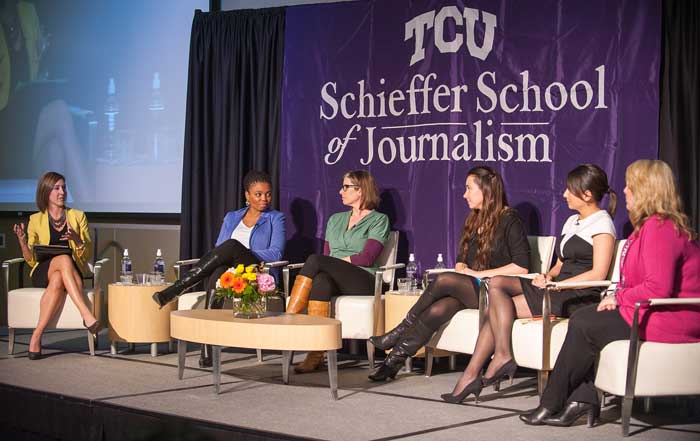ESPN panel urges women journalists to persevere
Work hard, develop a niche background to gain traction, a group of reporters, editors and producers say at Schieffer School of Journalism Symposium “The Emerging Role of Women in Sports Journalism.”

Staffers from ESPN, ESPN Digital and ESPN.com offer career advice and share personal work experiences at the Schieffer School of Journalism Symposium "The Emerging Role of Women in Sports Journalism." (Photography by Glen E. Ellman)
ESPN panel urges women journalists to persevere
Work hard, develop a niche background to gain traction, a group of reporters, editors and producers say at Schieffer School of Journalism Symposium “The Emerging Role of Women in Sports Journalism.”
At times, they’ve been the only women at press conferences and in locker rooms, elbowing their way in for a sound bite or standing their ground to get an interview.
Occasionally, they’ve heard whispered questions about their sports knowledge and suffered hate mail and worse on social media and message boards.
But fighting through stereotypes and gender isolation in a male-dominated profession is merely part of the job, a panel of five female ESPN staffers told a crowd of 125 students and faculty in February at the Schieffer School of Journalism Symposium called “The Emerging Role of Women in Sports Journalism.”
While gains have been made for more acceptance and opportunities within the profession, women journalists still must be ready for higher levels of scrutiny and the potential for more blowback after mistakes compared to their male counterparts, they agreed.
“You really have to turn off some of the socialization. If you are completely aware that you are the odd man out in a given situation, that’s going to work against you,” said Jane McManus, sportswriter for ESPN New York, who covers the NFL’s Jets. “You have to think of yourself as a reporter, not as the woman reporter.”
“I never thought I couldn’t do it,” said Jemele Hill, a columnist on ESPN.com, commentator on “First Take” and “Sports Reporters,” and budding sideline reporter. “I had a lot of confidence in myself.”
McManus and Hill were joined by Michele Steele, anchor and reporter for ESPN Digital; Jena Janovy, a member of ESPN’s editorial board and manager of the network’s enterprise and investigations unit; and Lori Higginbotham, a multimedia producer for ESPN The Magazine, who oversees the publication’s mobile apps. The forum was moderated by Joslyn Dalton, digital media strategy project manager for the network and founder of espnW.
“[A reporter’s] job is not to be liked,” McManus said. “As a matter of fact, sometimes, they may hate you. And that means you’re doing a good job, believe it or not. You have to ask the tough questions – that’s why you’re there. Don’t be afraid to do it.”
But all said they have found support from many of their colleagues. Even competitors are inclined to help after a reporter has established herself, said Janovy.
 “There’s been an emergence of strong and vocal women making their way in this world, helping to mentor,” she said. “I now find myself in the place of being a mentor to younger writers.”
“There’s been an emergence of strong and vocal women making their way in this world, helping to mentor,” she said. “I now find myself in the place of being a mentor to younger writers.”
Success and skill overcomes a lot, Higginbotham added.
“What matters is being good, being persistent,” she said. “That’s true of all journalists.”
Having a niche helps gain a foothold in the industry, said Steele, who used her economics background to begin work at Merril Lynch before getting on with Bloomberg Television. Later, she joined ESPN Digital, where she covers financial news, calling money “the connective tissue” in all big stories.
“Sports and television are two intensely competitive industries,” she said. “If you can do something that will differentiate yourself outside of being a big sports fan, or a big sports nut, it’s going to benefit you immeasurably.”
Higginbotham, the lone producer on the panel, said she benefitted by learning to write computer programming language JavaScript and Cascading Style Sheets code while at New York University.
“Take multimedia classes,” she urged. “Be really eager to learn in front of a really changing world.”
Janovy agreed, encouraging young journalists to learn the business-side of the profession.
“Knowing the editing, the writing, the producing, you have to know that, but you also need to understand web traffic, advertising and business decisions,” she said. “The business side is working hard to allow you to do that. Understand it. Ask questions.”
And in the faster, digital age of journalism now, accuracy helps build credibility, Janovy said.
“Inevitably, it is always better to be right than to be first,” she said. “So, whatever it takes to get it right – that’s what you got to do. You can be first, and if you’re wrong, people will remember that for the rest of your career.”
Expect to work hard, Higginbotham said.
“[Women] are in a generation where they’re not going out into the world as female journalists. They’re going out into the world as journalists,” she said. “You have to be good at what you do. There’s no magical gender or race or talent that’s going to make you good at this industry. It’s all you. It’s how hard you work.”
Hill reminded that it was two college journalists who revealed the sordid tale of Notre Dame linebacker Manti Te’o.
“As Jay-Z says, ‘Hustlers never sleep,’ ” she said.

Your comments are welcome
Comments
Related Reading:
Campus News: Alma Matters
Infographic: TCU’s Shared Values
The Board of Trustees adopted four TCU values after considering input from more than 4,000 constituents.
Campus News: Alma Matters
Passing the Torch
Artist Raymond Huyge designed the Flame of Knowledge in honor of TCU’s sesquicentennial-year commencement ceremony.